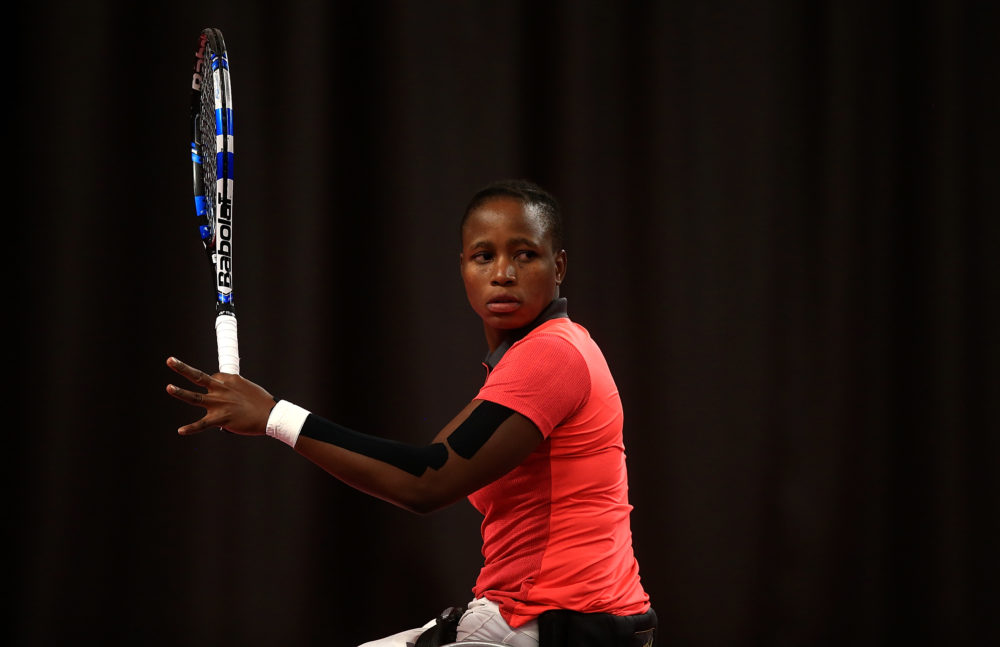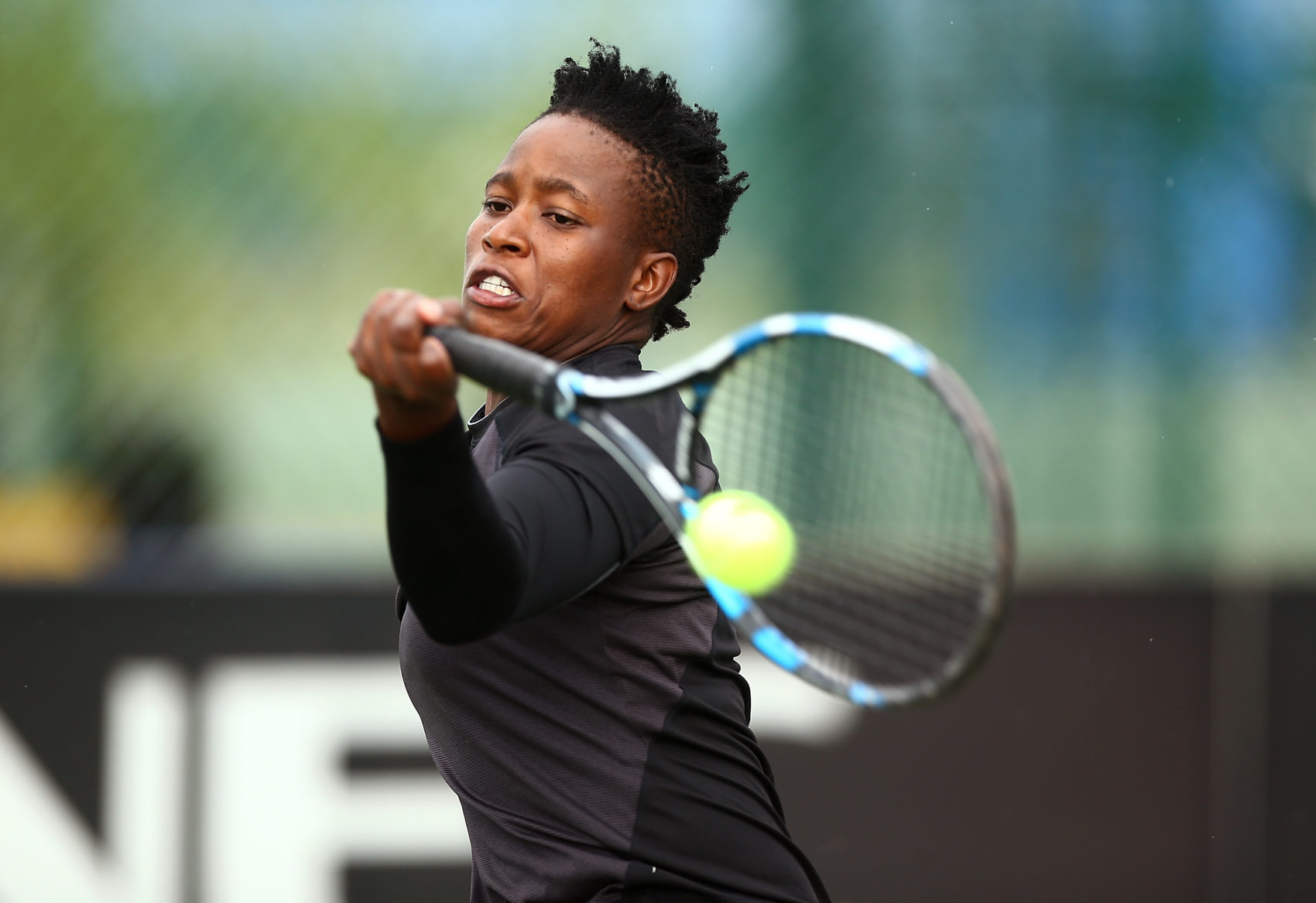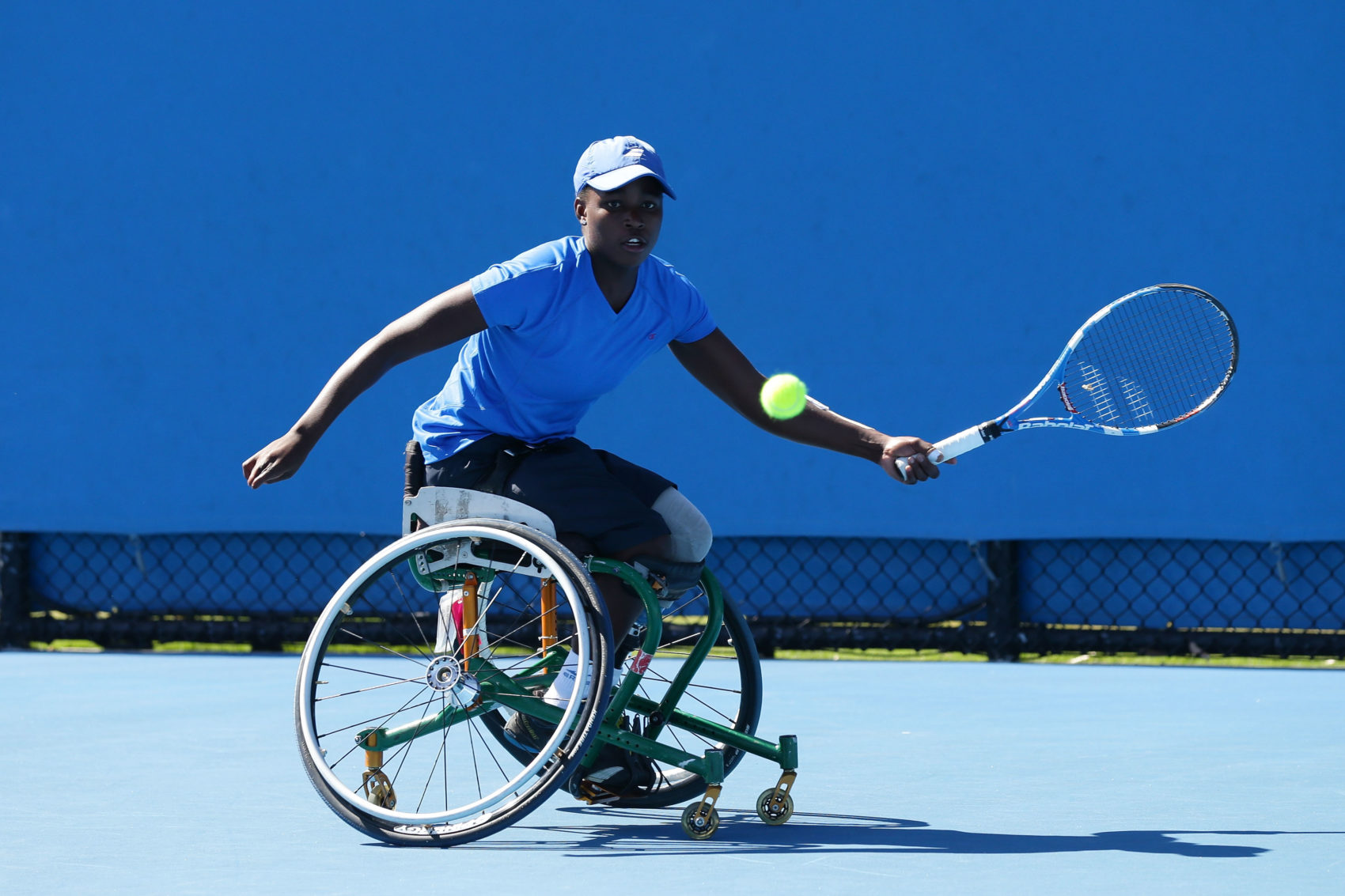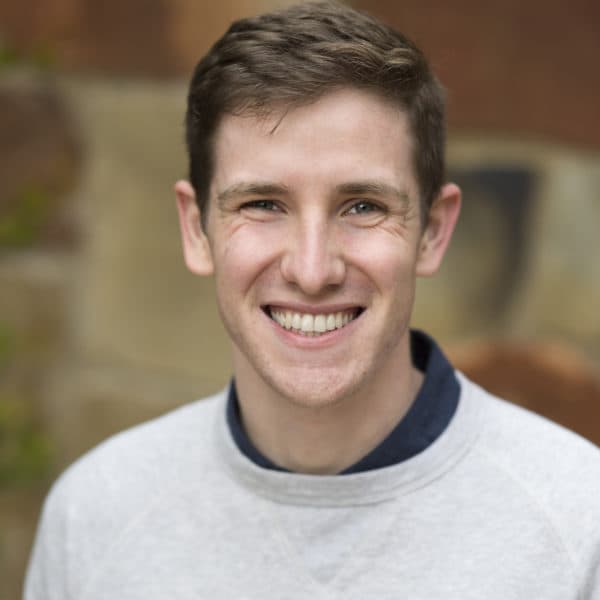Advertisement
A Wheelchair Tennis Player's Struggle For Sponsorship
Resume
Kgothatso Montjane didn’t plan on becoming a tennis player. She grew up in a rural South African village and had her left leg amputated when she was 12 years old due to complications from a congenital disorder. But in 2005, when she was still a teenager, a coach at her high school picked her to play wheelchair tennis at a camp.
"He was sort of, like, telling me that you're going to go and represent the school in this sport," Kgothatso says. "Despite me telling him that I don't play this sport at all, and I don't know what it is."
Kgothatso started competing in tournaments. She says her first cash prize was just 600 Rand, or about $43. But she kept training. And she got good. Quickly.
South Africa's Best
Within two years, Kgothatso was one of the top five women’s wheelchair tennis players in the world. She says that at her peak, Tennis South Africa was sending her to tournaments half the weeks out of the year.
"Seeing the world, it's something that I never thought I would see," Kgothatsi says. "Being out there, interacting with different people, learning different cultures. There was something amazing about it."
Kgothatso represented her country in the 2008, 2012 and 2016 summer Olympics. But in February 2017, Tennis South Africa delivered some news.
"They were in negotiations to try to renew the sponsor," Kgothatso recalls. "But, at this moment in time, [they said,] ‘We really don't have, like, enough money to keep you guys going. So we think it's about time you try to look out for something for yourself out there.’ "
At first, Kgothatso says, she didn’t take the news too seriously. She figured that the federation would find more money before it would start affecting her ability to travel and enter tournaments.
Kgothatso won three tournaments that summer — but the federation wasn’t getting any closer to securing a new sponsorship. And she started getting nervous.
In the fall, she says, she decided to follow the federation’s advice and search for her own sponsor. She used Google to find proposal templates and sent drafts of her work to the federation’s PR guy to check her grammar.
"It was quite stressful," Kgothatso says. "I'm not a marketing person or anything, so I didn't even know if it looked good enough or if I did it how it's supposed to be done."
The search started taking up more and more of her time. Sometimes, she’d work between training sessions — often, for a few hours before bed.
She even emailed South Africa’s former first lady Zanele Mbeki, asking for help. Kgothatso remembers seeing her in the stands at a few tournaments.
"I don't want to lie, but I know — it might have been four or five times, me sending the same thing to her," Kgothatso says. "And there was no communication at all. Something really just said to me, ‘Keep sending those things. You never know.’ "
Out Of Time
2018 rolled around. No new sponsors came. And then, that March, Tennis South Africa sent word: they were officially out of money. They could no longer pay for Kgothatso to travel or compete, and they’d withdrawn her from several upcoming tournaments. Kgothatso says she had to start living off her savings.
"It was tough, you know, when you don't even know if you're going to be able to pay your bills, or what you are going to eat, because you're not playing at all," Kgothatso says. "If you don't play, then you don't earn anything. I was just like, ‘I will see who comes through for me.’
"And, obviously, thinking that maybe it's about time I also, you know, redo my CV. Maybe try looking for something else, then."
I ask her what other jobs she was thinking she'd pursue if tennis didn't work out.
"You know, honestly, I didn't know — I just didn't know what I was going to do," Kgothatso says. "I didn't have any hope at all. I didn't have any hope at all."
Through it all, though, she kept training.
"That's what keeps me sane," Kgothatso says. "I just kept practicing every day. I just kept going to the gym. When I play tennis, it's just like I'm starting the day on a clean slate. You know, with my mind reset and all that. I just kept my normal routine going, even though I knew — after all that, coming home, back to reality — that this is how the situation is."
On March 25, 2018, Kgothatso got a glimmer of hope — in the form of an email from the assistant to former first lady Zanele Mbeki. She's also the founder of a women-focused microfinance group. And she wanted to donate 80,000 Rand — about $5,700 — towards keeping Kgothatso’s career going.
The two weren’t able to meet until early May. In the meantime, as Kgothatso missed competitions, her international ranking dropped — from No. 6, to No. 7, to No. 8.
Finally, Mbeki’s donation came through. It was just in time for Kgothatso to make it to the French Open at Roland Garros in June.
"I don't think I was going to make it to Roland Garros if it wasn't for her support," Kgothatso says. "I don't think so."
Money was still tight. Kgothatso didn’t have enough to pay her coach’s fee for the tournament, but he came anyway. Instead of staying in a hotel, the two rented a small apartment close to the stadium.
By this time, Kgothatso hadn’t competed in two full months. She lost her first-round match in three sets.
"After Roland Garros, I went to another tournament in Paris," Kgothatso says. "And I think three days after the tournament, that's when I got the email that said, ‘You've been given a wild card into Wimbledon.’ "
Kgothatso had never competed in Wimbledon before. She says she was thrilled — but there was a problem. Even with Mbeki’s donation and the consolation money from her first-round loss at Roland Garros, Kgothatso could only pay for one plane ticket to London.
"One has to go and it had to be me — the player," Kgothatso says.
'It Had To Be Me'
Without her coach, Kgothatso wouldn't just be missing the person who helped her strategize before matches, the person who could offer her pointers for playing on a grass court for the very first time — she wouldn't even have someone familiar to warm up with.
So Kgothatso got in touch with friends in the U.K. They found someone who could at least hit some balls with her before Wimbledon.
When she showed up in London, Kgothatso was the only player there without a coach.
"Going into that first match, I was so nervous," Kgothatso says. "I didn't even know where I'm going to look. Because normally when your coach is out there, you normally draw your strength when you keep eye contact. So going onto that court, I was nervous. I was unsettled."
But even as the last entry into the tournament — and with her coach a hemisphere away — Kgothatso won her opening match in three sets: 6–3, 2–6, 6–1.

"Maybe it had to happen that way," Kgothatso says. "Because that's the situation that really actually keeps you strong. And you find something in you that you didn't know before. I was able to keep my head up and keep going."
Kgothatso lost to the eventual champion in the next round. But she came away with over $16,000 in prize money — and another distinction. She’d become the first black South African woman to compete at Wimbledon — wheelchaired or able-bodied.
"I really drew motivation from that and inspiration, because I just thought if I could do it, then it would give hope to other African players," Kgothatso says. "It was just huge, you know. So, I think, just taking part in Wimbledon, I would say it sort of turned the whole thing around."
Optimize
Kgothatso says her historic Wimbledon appearance got a lot of attention in South Africa. Even the President, Cyril Ramaphosa, tweeted about her success. When she got back home, Kgothatso started doing interviews, including one with one of South Africa’s top national radio shows.
The day after Kgothatso’s appearance, the host interviewed another woman named Emy Casaletti-Bwalya. She’s the CEO of a South African Marketing Agency called Optimize.
Kgothatso says that the radio host had asked her to tune in for this interview. As she listened, the host asked Casaletti-Bwalya about how athletes could put themselves in the best position to land endorsements. And then, the host brought up Kgothatso’s story. And live, on the radio, the Optimize CEO said she’d take a look into helping Kgothatso find sponsorship.
"I just thought it was God answering my prayers, finally," Kgothatso remembers. "Having people coming through for me to help me keep this dream going. It was unbelievable, to be honest. The following day, I went and met up with them, and that's when they said to me, ‘We're going to make sure you go to US Open without struggles.’ "
In the six weeks between Wimbledon and the US Open, Optimize secured Kgothatso with sponsorships from 10 different companies. She made it to New York for the Open and won her first-round match. And this past January, Optimize helped Kgothatso sign with one more new sponsor: Nike.
The three-year deal provides gear for both her and her coach — and some long-awaited breathing room so that she can focus on her tennis.
"I'm actually at peace, and I’m just in a good space," Kgothatso says. "And I’m more relaxed and working hard on preparing for Wimbledon at the moment."

Kgothatso’s appearance at last year’s US Open made her the first African wheelchair tennis player to compete in all four Grand Slams in the same calendar year. She’s currently ranked No. 5 in the world, and she's the only African player in the top 35.
It’s been almost 15 years since Kgothatso Montjane stumbled upon tennis. But now, she says, she knows it wasn’t a mistake.
"I just thought, maybe this journey — it's just what God chose for me," Kgothatso says. "Maybe that's the reason why I kept going even when things were not going my way. I never gave up, even when I thought of giving up. So I think this is what I was designed for."
This segment aired on July 6, 2019.

